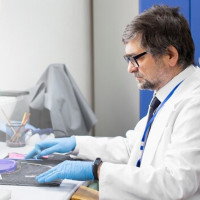Repurposed Drugs against the Latest Variants of Concerns of SARS-CoV-2

Strong 8k brings an ultra-HD IPTV experience to your living room and your pocket.
The present concern of COVID-19 is the rapid emergence of variants of SARS-CoV-2, such as Omicron, that showed high transmission potential. Thus, discovering potential drug candidates is one of the utmost concerns. Repurposing FDA-approved drugs that are already in use is probably one of the most promising strategies, however, such applications require extensive studies and research.
Introduction
The severe acute respiratory syndrome coronavirus-2 (SARS-CoV-2) affected all areas of life and the economy by causing COVID-19 and creating alarming caution in the form of variants of concerns (VoC). The latest VoC that are of public health relevance are Alpha (B.1.1.7), Beta (B.1.351), Gamma (P.1), Delta (B.1.617.2), and Omicron (B.1.1.529). Due to the emerging spread of these VoCs, several vaccines that are already approved by the World Health Organisation showed limited activities against VoC and even those who have already been vaccinated with repeated and multiple doses are susceptible to the infection. Thus, identifying potential solutions and probable therapeutics have high scope and relevance in pharmaceutical sectors. While conventional drug discovery pipelines against any new infections are a tedious task with complexity, initial investments, manpower, and time, computational drug discovery with the aid of data sciences is gaining attention in the pharmaceutical sectors. The latest developments in computational biology have led to the enhanced scope of drug repurposing via the approaches such as structure-based screening techniques like molecular profiling and target identification, molecular docking, molecular dynamic simulations, quantitative structure-activity relationships, network-based approaches, and artificial intelligence and machine and deep learning algorithms.
Drug repurposing: A new paradigm shift of old strategies
The concept of drug repurposing attains attention in clinical trials that substantially reduce the time and cost in new drug developments. Drug repurposing, otherwise known as drug repositioning, is the approach of utilising existing and FDA-approved drugs for treating infections and diseases including several emerging infections. Drug repurposing is rational and fascinating approach, providing less time and cost requirements for specific drug screening and development. Several potential drugs do not enter clinical trials, and less than 15% of the lead candidates get approval. There are several examples of repurposed drugs are in practice that included aspirin, the cyclooxygenase inhibitor for coronary heart disease, sildenafil, a phosphodiesterase inhibitor for erectile dysfunction, antibiotic erythromycin for gastric motility and thalidomide, an antiemetic against multiple myeloma. At present, there is considerable scope in the repurposing of drugs to enhance the identification of lead molecules that can prevent or treat COVID-19. The major aspects of drug repositioning are to enhance the traditional drug development approaches by searching for safe, novel, and effective drugs in humans. The primary focus for these aspects is the application of drugs that have the same molecular pathways but are involved in various diseases. The major mechanism of drug repurposing is depending on the type and nature of the molecular targets to which the drugs are delivered. One of the major drivers of drug repurposing has been the accidental discovery of the pharmacological properties of new molecular targets, indicating an innovative use of drugs. For example, FDA-approved drugs such as ritonavir and lopinavir have been extensively used against Human Immunodeficiency Virus-1 and 2 (HIV). These drugs were also suggested repurposed for the treatment of COVID-19. This is due to the fact of the likeness of the SARS-CoV and MERS-CoV (beta coronavirus) genome sequences to SARS-CoV-2. Therefore, the drugs that have been utilised for the treatment of MERS-CoV and SARS-CoV-2 were probably employed for the treatment of the VoC causing COVID-19, which implies that the action mechanism of repurposed drugs toward their targets must be like their family target members. The administration of such drugs to patients with moderate COVID-19 infections showed a substantial response which confirms the concept of drug repurposing. The major aspects of drug repurposing depend on two scientific facts: the screening of drugs based on the interpretation of the human genome which share the common targets in cases of several diseases, and the idea of pleiotropic drugs.
The main road map of computational drug repurposing started with the mining of primary drug data, their target, and the disease. A drug-disease pathway is constructed and their features will be extracted and filtered thoroughly. A computer-aided analysis is performed via the approaches such as machine learning that involve the structural analysis of the drug compounds.The repurposing of the drug is known to reduce the costs required for the development of a new lead candidate, with extra savings in pre-clinical phases I and II. Furthermore, concerning COVID-19 research, the scope of repurposing also has applications in several areas such as precision medicine, rapid therapeutic options, screening of multiple purposes for existing drugs, and identification of direct-acting and host-targeting antivirals.
The elucidation of detailed molecular mechanisms between the interaction of drugs and their molecular targets is a critical component in the discovery of drugs. Though various biophysical and biochemical approaches are available to study the molecular interactions of the small compounds with their targets, the powerful approach is structure-based computational biology aspects which can assist in predicting the molecular basis of the interaction between the complexes. Thus, repurposing the drug is an attractive and alternative approach to identifying the appropriate lead candidates from the existing diverse and focused libraries, to combat diseases. When concerning the developments in multiplex assays, data mining, cell-based screening, bioinformatics, and chem-informatics approaches, and the utilisation of their databases, pharmaceutical industries have demonstrated greater interest in screening molecules that showed failures due to several reasons. Three major steps are essential before the process of repurposing drugs. Firstly, the identification of drug molecules for the specific disease. Secondly, evaluation and assessment of the selected drug compounds in pre-clinical models. Thirdly, evaluation of safety in phase II clinical trials. The repurposing of the drugs can be classified into experimental and computational techniques. With the aid of combinatorial approaches to these aspects, better outcomes can be achieved than when they are used individually. The computational approaches are highly data-driven approaches that necessitate the utilisation of genetic expressions, structural analysis of lead compounds, and the proteomic data of drug candidates. The computational medicinal chemistry approaches provide a pivotal role in the drug repurposing process.
Structure‑based drug discovery
The structure-based approach namely virtual screening helps to identify small molecules from currently available repositories that can be utilised for repurposing. The studies have utilised molecular docking approaches for virtual screening against the potential targets of SARS-CoV-2, such as the main protease for the repurposing of probable drugs such as β-eudesmol, digitoxigenin, ritonavir, hesperidin, rutin, indinavir, crocin, and emetine. In addition, the other virtual screening approaches such as combinations of molecular docking with molecular dynamic (MD) simulations and free energy binding calculations by MM-GBSA studies and two-way molecular docking with computational ADMET prediction studies for COVID-19 drug repurposing. The major strategies used for the structure-based screening of drug repurposing are molecular docking, MD simulations, and quantitative structure-activity relationship analysis
Read more: https://www.pharmafocusasia.com/articles/repurposed-drugs-against-the-latest-variants-of-concerns-of-sars-cov-2
Note: IndiBlogHub features both user-submitted and editorial content. We do not verify third-party contributions. Read our Disclaimer and Privacy Policyfor details.


